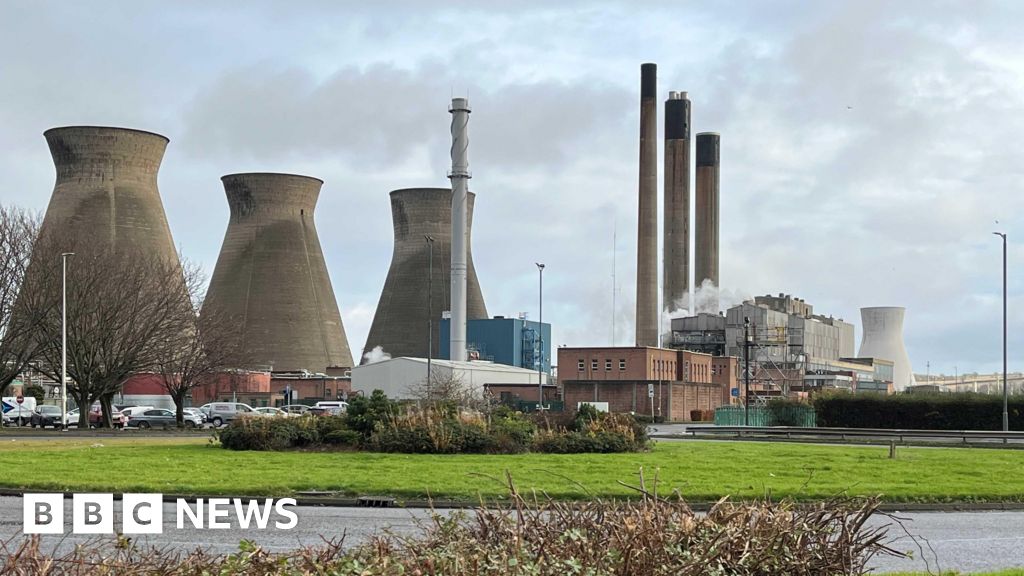World
Scottish government misses another climate change target – BBC News

- Author, Kevin Keane
- Role, BBC Scotland’s environment correspondent
The Scottish government has missed another of its key annual targets for reducing planet-warming greenhouse gas emissions.
Figures for 2022 show that emissions fell by 50% from its 1990 baseline.
This is slightly down on the previous year’s figures but well short of its target of a 53.8% reduction.
It means ministers have now missed nine of the past 13 annual benchmarks for tackling climate change.
This is likely to be the last time progress will be measured against annual targets with the Scottish government confirming in April that it will scrap all but the 2045 net zero goal.
The annual targets will be replaced with carbon budgets covering each five-year Parliamentary term, in line with the rest of the UK.
The interim target of reducing emissions by 75% by 2030 was ditched with ministers admitting it was “out of reach”.
The latest figures show that domestic transport emissions have increased and are still the single largest source of greenhouse gases in Scotland.
A continued rebound from the pandemic is being blamed for the rise which now accounts for 28.3% of total emissions.
Emissions from international aviation and shipping have almost doubled on the figure from the previous year but they still only account for 3.7% of total emissions.
Although the year-on-year change in overall emissions is just 0.1%, the rise in transport masks falls in other sectors.
Agricultural emissions have fallen by 3.2% while residential emissions are down by a significant 16.3%.
The residential changes are largely down to higher gas prices and relatively mild temperatures during the start of the year.
Meanwhile, the amount of carbon dioxide being removed from the atmosphere through natural processes such as tree planting and growing grass is now as large as the emissions being released through domestic transport.
Net Zero Secretary Mairi McAllan said Scotland’s emissions had reduced further than the rest of the UK according to the latest figures, with England’s emissions dropping by 49%, those in Wales by 36.5% and Northern Ireland by 25.9%.
However, because the targets are legally binding, she will have to address MSPs at Holyrood to explain how they will be brought back on track.
Ms McAllan said: “We are now in the second half of our journey to net zero and our 2045 target is one of the most ambitious in the world.
“Action on climate change will require a genuine transformation across our economy and society, with significant changes in sectors such as heat in buildings, transport, energy and agriculture.”
She added that legislation currently making its way through parliament, including the Agriculture and Circular Economy Bills, would drive down emissions further in the coming years.
‘Convenient smokescreen’
Amendments are expected to be made later this year to the Climate Change Act which will see the scrapping of all remaining annual targets with the exception of the net-zero goal for 2045.
By this time all Scotland’s residual emissions should be offset by natural or engineered removals such as tree planting or direct air capture.
The current targets are expected to be replaced by carbon budgets which will be set for each parliamentary term.
This would bring Scotland into line with the methodology used in the rest of the UK.
Mike Robinson, chair of Stop Climate Chaos Scotland (SCCS) said: “To miss yet another annual climate target, despite emissions in 2022 continuing to be affected by pandemic restrictions and a mild winter, reflects the ongoing absence of strong climate action by both Holyrood and Westminster governments.”
“The longer action to cut emissions is delayed, the greater the risks, higher the costs, and the longer people in Scotland miss out on the benefits of warmer homes, lower energy bills and cleaner air.”
Lewis Ryder-Jones, Oxfam Scotland’s advocacy adviser, said: “This ninth failure in 13 years proves that, once again, team Scotland has lost momentum in the highest stakes match in town.
“With Scotland’s annual targets set to be scrapped, it’s deeply concerning that the annual climate goal posts aren’t just being moved, they’re being removed, creating a convenient smokescreen to mask an undeniable lack of sufficient climate action.”








